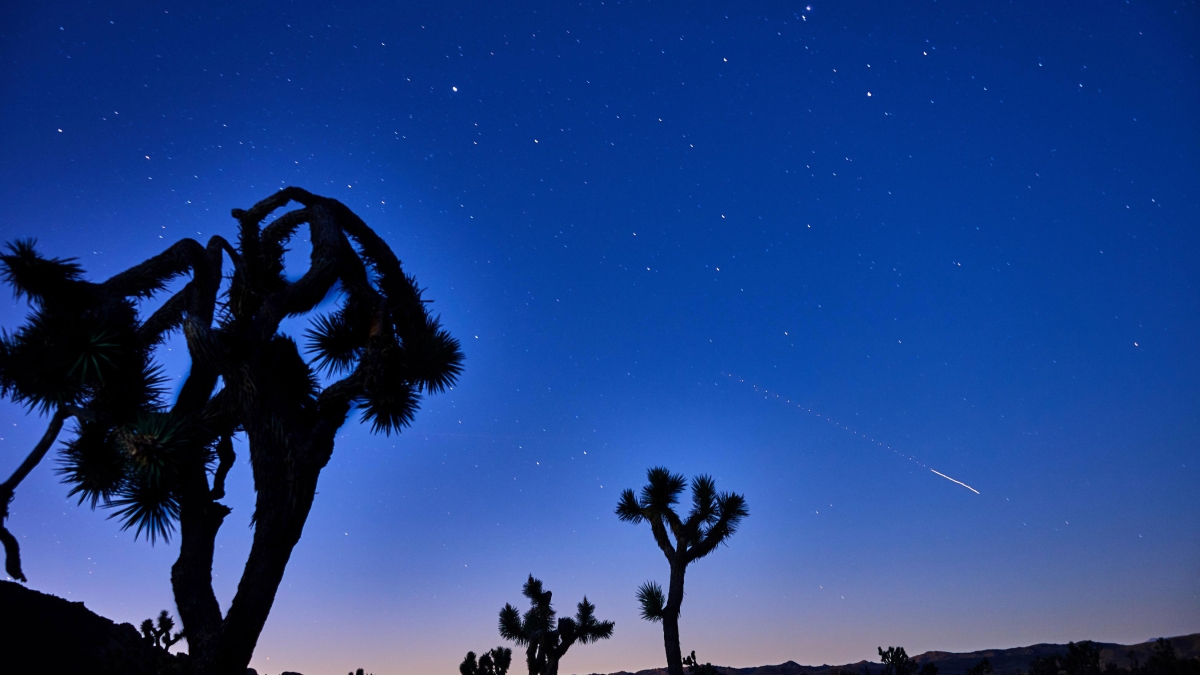Prisms Contemporary Music Festival explores the music of outer space

The morning sky at Joshua Tree. Photo by Garth Paine
The ninth Prisms Contemporary Music Festival at Arizona State University foregrounds music that reflects on outer space, presenting compelling works from a wide range of artists from Europe and the United States. Organized by Simone Mancuso, faculty associate of percussion in the School of Music in ASU’s Herberger Institute for Design and the Arts, and Sabine Feisst, professor of musicology in the School of Music, this year’s festival will be held Oct. 27–29.
Outer space and space exploration has inspired many musicians: For composer Sun Ra, “Space Is the Place” where he wanted to transport his audience on a spaceship fueled by music. Mary Lou Williams crafted evocative compositions based on the alignments of stars that form the Zodiac. Annie Gosfield creatively responded to the abstract bleeps, blips and static of satellite broadcasts. Gerard Grisey and Augusta Read Thomas created works evoking pulsars and rotating neutron stars emitting electromagnetic radiation first discovered in 1967.
“The year’s theme allows us to present live performances of such iconic yet rarely heard works as Sun Ra’s ‘Interstellar Space Low Ways’ and ‘Tapestry from an Asteroid’ for jazz ensemble; Gerard Grisey’s ‘Le Noir de l’Etoile’ for six percussionists placed around the audience, recordings of pulsars and narration; and Annie Gosfield’s ‘Lost Signals – Drifting Satellites’ for violin and recorded satellite sounds,” said Feisst. “The festival’s programs project African-American and female voices in powerful ways and span works composed in the last 70 years, with the majority of the repertoire created during and after the Space Race.”
Offering the highest-quality performances of experimental music in the southwestern United States, the annual Prisms Contemporary Music Festival comprises themed concerts including world and U.S. premieres. The festival showcases great music that is rarely performed, along with pre-concert talks, round tables, film screenings, installations and workshops. The goal of the festival, founded by Mancuso and Glenn Hackbarth in 2009, is to promote the view that music is a living tradition — an exciting and vibrant part of modern life — and to pass on that belief by combining performances with informative lectures and discussions for ASU students, faculty and the local community.
“Each year we offer a wide range of events and pioneering works from inventors of a trend to representatives of the latest and most innovative tendency,” Mancuso said. “This year’s festival opens with an outdoor performance that allows the audience to undertake both a sonic and stargazing journey.”
ASU faculty will join the Phoenix-based interdisciplinary ensemble Crossing 32nd Street for the festival’s opening piece. Students in the School of Music and the Acoustic Ecology Lab are offering a sound installation titled “Asterism” and a Celestial Soundwalk.
“I hope that the participants in this festival are inspired by the spectrum of music and discussions offered,” Feisst said. “Hopefully they can explore these musical directions further — as performers, composers or as listeners.”
Prisms Contemporary Music Festival highlights
Concerts are free unless otherwise noted. Ticketed concert prices range from $5–9. Tickets can be purchased at the Herberger Institute box office.
Concert: 'The Black of the Star'
Crossing 32nd Street Ensemble
7:30 p.m., Saturday, Oct. 27
Nelson Fine Arts Plaza, adjacent to ASU’s School of Music
Ticketed
Featuring Phoenix-based experimental music group Crossing 32nd Street, this concert showcases the Arizona premiere of Gerard Grisey’s "Le Noir de l’Etoile" ("The Black of the Star") for six percussionists placed around the audience, audio recordings of pulsars and a text authored by astrophysicist Jean-Pierre Luminet and narrated by Lindy Elkins-Tanton, director of ASU’s School of Earth and Space Exploration, co-chair of the Interplanetary Initiative and principal investigator of NASA’s Psyche mission.
Lecture: Afro-Futurism
Christopher Stover
1:30 p.m, Sunday, Oct. 28
Katzin Concert Hall, ASU School of Music
Concert: 'Celestial Africa: Outer space and African-American musical voices'
2:30 p.m., Sunday, Oct. 28
Katzin Concert Hall, ASU School of Music
Ticketed
An evening of powerful musical commentary on the transformative potential of outer space by African-American composers Mary Lou Williams, Julius Hemphill, Sun Ra, Cecil Taylor and John Coltrane, curated and arranged by Chris Stover.
Sound Installation: Asterism
9 a.m.– 9 p.m., Monday, Oct. 29
Cowley Lobby, ASU School of Music
Immerse yourself in sonic fabrics derived from electromagnetic vibrations found in outer space through the six-channel sound installation “Asterism,” created by composition student Jacob M. Smith.
Celestial Soundwalk
6 p.m., Monday, Oct. 29
Meeting Point: Cowley Lobby, ASU School of Music
Plotted by musicology students Anne-Marie Shaver and Hunter Langenhorst, this walk will tune you into the nocturnal sounds of the Tempe campus. The second part of this soundwalk requires the use of smartphones and earbuds to experience space sounds selected and mapped onto a section of the route by composition student Jacob M. Smith.
Concert: 'Celestial Mechanics'
Arizona Contemporary Music Ensemble directed by Simone Mancuso
7:30 p.m., Monday, Oct. 29
Katzin Concert Hall, ASU School of Music
The Arizona Contemporary Music Ensemble presents chamber works by George Crumb, Annie Gosfield, Jeremy Muller, Kaija Saariaho and Augusta Read Thomas, reflecting on such outer space themes as space probes, satellites and pulsars.
More Science and technology

ASU-led space telescope is ready to fly
The Star Planet Activity Research CubeSat, or SPARCS, a small space telescope that will monitor the flares and sunspot activity…

ASU at the heart of the state's revitalized microelectronics industry
A stronger local economy, more reliable technology, and a future where our computers and devices do the impossible: that’s the…

Breakthrough copper alloy achieves unprecedented high-temperature performance
A team of researchers from Arizona State University, the U.S. Army Research Laboratory, Lehigh University and Louisiana State…

